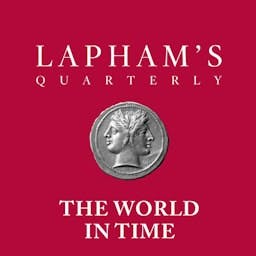

The World in Time / Lapham’s Quarterly
Lapham’s Quarterly
Donovan Hohn, the acting editor of Lapham's Quarterly, interviews historians, writers, and journalists about books that bring voices from the past up to the microphone of the present. New episodes are released weekly.
Episodes
Mentioned books

Jan 31, 2020 • 46min
Episode 54: Gaia Vince
Lewis H. Lapham speaks with Gaia Vince, author of “Transcendence: How Humans Evolved through Fire, Language, Beauty, and Time.”
Thanks to our generous donors. Lead support for this podcast has been provided by Elizabeth “Lisette” Prince. Additional support was provided by James J. “Jimmy” Coleman Jr.

Dec 6, 2019 • 41min
Episode 53: Eugene McCarraher
“The history of capitalism in America has been a tale of predation,” historian Eugene McCarraher writes at the beginning of The Enchantments of Mammon: How Capitalism Became the Religion of Modernity, “an ambitious but inexorably grotesque and destructive endeavor in the manufacture of beatitude, and that story is arguably winding down to its conclusion. What better time to trace the outlines of that history and inquire into the possibilities that lie dormant in the present?”
In the latest episode of The World in Time, Lewis H. Lapham and McCarraher discuss and unpack the author’s argument that “we should welcome the demise of our misenchanted way of life as an opportunity for repentance and renewal. But redemption can only come if we tell a different story about our country and its unexceptional sins.”
Lewis H. Lapham speaks with Eugene McCarraher, author of The Enchantments of Mammon: How Capitalism Became the Religion of Modernity.
Thanks to our generous donors. Lead support for this podcast has been provided by Elizabeth “Lisette” Prince. Additional support was provided by James J. “Jimmy” Coleman Jr.

Nov 22, 2019 • 42min
Episode 52: Matt Stoller
Lewis H. Lapham speaks with Matt Stoller, author of “Goliath: The 100-Year War Between Monopoly Power and Democracy.”
Thanks to our generous donors. Lead support for this podcast has been provided by Elizabeth “Lisette” Prince. Additional support was provided by James J. “Jimmy” Coleman Jr.

Nov 8, 2019 • 47min
Episode 51: Andrew Delbanco
Lewis H. Lapham speaks with Andrew Delbanco, author of “The War Before the War: Fugitive Slaves and the Struggle for America’s Soul from the Revolution to the Civil War.”

Oct 11, 2019 • 51min
Episode 50: Harlow Giles Unger
Lewis H. Lapham speaks with Harlow Giles Unger, author of “Thomas Paine and the Clarion Call for American Independence.”
Thanks to our generous donors. Lead support for this podcast has been provided by Elizabeth “Lisette” Prince. Additional support was provided by James J. “Jimmy” Coleman Jr.

Sep 27, 2019 • 51min
Episode 49: William Dalrymple
Lewis H. Lapham speaks with the author of The Anarchy: The Relentless Rise of the East India Company.

Sep 13, 2019 • 33min
Episode 48: Isabella Tree
Lewis H. Lapham talks with the author of Wilding: Returning Nature to Our Farm.

Aug 16, 2019 • 47min
Episode 47: Ziya Tong
Lewis H. Lapham talks with Ziya Tong, author of The Reality Bubble: Blind Spots, Hidden Truths, and the Dangerous Illusions That Shape Our World.
Thanks to our generous donors. Lead support for this podcast has been provided by Elizabeth “Lisette” Prince. Additional support was provided by James J. “Jimmy” Coleman Jr.

Jun 28, 2019 • 50min
Episode 46: Rick Atkinson
Lewis H. Lapham talks with the author of “The British Are Coming: The War for America, Lexington to Princeton, 1775-1777.”
Thanks to our generous donors. Lead support for this podcast has been provided by Elizabeth “Lisette” Prince. Additional support was provided by James J. “Jimmy” Coleman Jr.

Jun 14, 2019 • 46min
Episode 45: David Wallace-Wells
This week on The World in Time, Lewis H. Lapham talks with David Wallace-Wells, author of “The Uninhabitable Earth: Life After Warming.”
Thanks to our generous donors. Lead support for this podcast has been provided by Elizabeth “Lisette” Prince. Additional support was provided by James J. “Jimmy” Coleman Jr.


